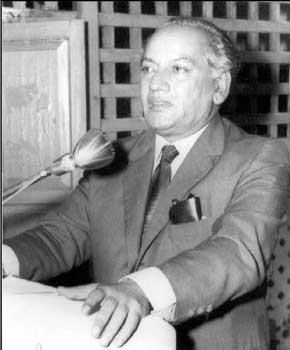PADF Literary Forum Recounts Faiz’s Genius
 Washington , DC: Pakistan American Democratic Forum, among its other varied activities, holds a quarterly literary forum rotating between the East Coast, West Coast, South and the Midwest.
Washington , DC: Pakistan American Democratic Forum, among its other varied activities, holds a quarterly literary forum rotating between the East Coast, West Coast, South and the Midwest.
At its recent meeting at DC's L'Enfant Hotel billed Bayad-e-Faiz Ahmed Faiz, speakers dwelt at length over the multifarious facets of his exemplary life and many literary achievements.
Renowned literary figure, Dr. Muazzam Siddiqui chaired the proceedings. In his remarks, he observed that Faiz was a poet of versatile qualities. Faiz had sought inspiration from Hafiz, Maulana Rome and Ghalib's rich poetic thought content.
He was particularly influenced by Mirza Ghalib whose ample evidence could be seen in the naming of his first poetic collection as 'Naqsh-e-Faryadi,' after Ghalib's poem bearing that title.
The lynching of legendary mystic Mansoor is reflective of the divine concept of love and unity of being in Muslim literature. Like Hafiz, Faiz's poetic imagery was ultimate; while in Naqshe Faryadi, he speaks volumes of the universal affinity, bonds and enviable aspirations.
Faiz is universal in approach as he speaks of larger human race in 'Lazm hey ham bhee dekhein gey, ham dekhein gey'.
Dr. Agha Saeed, the organizer of the event, said that his illustrious father was a noted figure whose friends included Habib Jalib, Khan Ghaffar Khan and Faiz Ahmed Faiz. This was how he came to know of Faiz, Jalib and Khan Ghaffar Khan, while still a youngster.
"Since we know Faiz Sahib as an exceptionally talented poet, very little attention has been paid to his equally insightful prose", Dr. Agha Saeed said. "Faiz Sahib has written some of the most penetrating essays about Pakistani culture."
In support of his contention that Faiz was a great cultural theorist, Agha Sahib referred to Faiz's short essay "Pakistan Kehan Hai" (Where is Pakistan?) in which, after quoting a fragment of his conversation with someone he had met in Cuba, Faiz Sahib, most convincingly argues that how Pakistan is perceived in Africa, Latin America, Asia, Europe or the United States, is not up to the diplomats, bureaucrats or even politicians but for Pakistani poets, writers, thinkers and intellectuals."
Faiz is often blamed for his complete silence during the military action in East Pakistan, which had prompted fellow progressive poet Sahir Ludhyhanawi to write:
Remorse of the great poet at his own perplexing silence was expressed in a poem Dhaka say Vapsi ke Baad (After returning from Decca) penned in 1974:
Abul Hasan Naghmi, a former senior producer of Radio Pakistan, in his peculiar style detailed the days Faiz was living in Lahore, and interesting memories about the poet's family life.
He stated that in respect of learning of Arabic language, Faiz was student of Maulana Muhammad Shafi. He quoted late literary luminary Ashfaq Ahmed once stating about Faiz that he belonged to 'Malamati sect' of thinkers, in symbolic mystic jargon of eminence.
Naghmi said, Faiz had an intelligent personality. 'Commenting on Allama Iqbal's 'Shikwa jawab -e-shikwa', Faiz once stated that it was no more than Mochi Gate style poetry.'
Naghmi remembered Faiz visiting the United States in the early eighties. During the visit, he came to Falls Church, Virginia, where a 'mushaira' was held with Faiz as the chief guest. But the organizers asked Faiz's fans to purchase entry tickets. Learning about this newly injected practice, Faiz aptly said that the world was divided in two groups of people: ''poets and the rest non-poets.''
In the same poetic recital, Faiz was asked to present some of his recent Punjabi poems, to which Faiz retorted, ''How many among you really know Punjabi?''
Once in Sialkot, people insisted Faiz to say his prayers in a town mosque, to which Faiz responded: ''I would certainly do so, but my precondition is that I would like to lead the prayers myself.''
Referring to Faiz's poem 'Raj karey gey khalq-e-khuda', he said Faiz was out and out for the downtrodden and the poor.
Mona Shahab said Faiz gave a new lease of life and meaning to the Urdu Ghazal. ''Faiz had a healthy and energetic mind which comforted and healed ills of a diseased society.''
Dr. Nisar Chaudhry, president, Pakistani American League, said poets like Faiz are born in centuries and they transcend limits of the era they live in. ''Faiz's message is universal, and enriches the thought content of Urdu literature.''
Mona Shahab and Abul Hasan Naghmi recited their poems and ghazals, which enthralled the large audience of literature lovers.
In his concluding remarks, Dr. Agha Saeed said it was encouraging to note that PADF seminars and symposia were attracting a large audience, and announced that he intended to hold many such events that would prove helpful in educating the enthusiastic participants.
Salim Akhtar, a senior official of the PADF, thanked the speakers and the audience for their show of keen interest in the forums.
-------------------------------------------------------------------------------------

